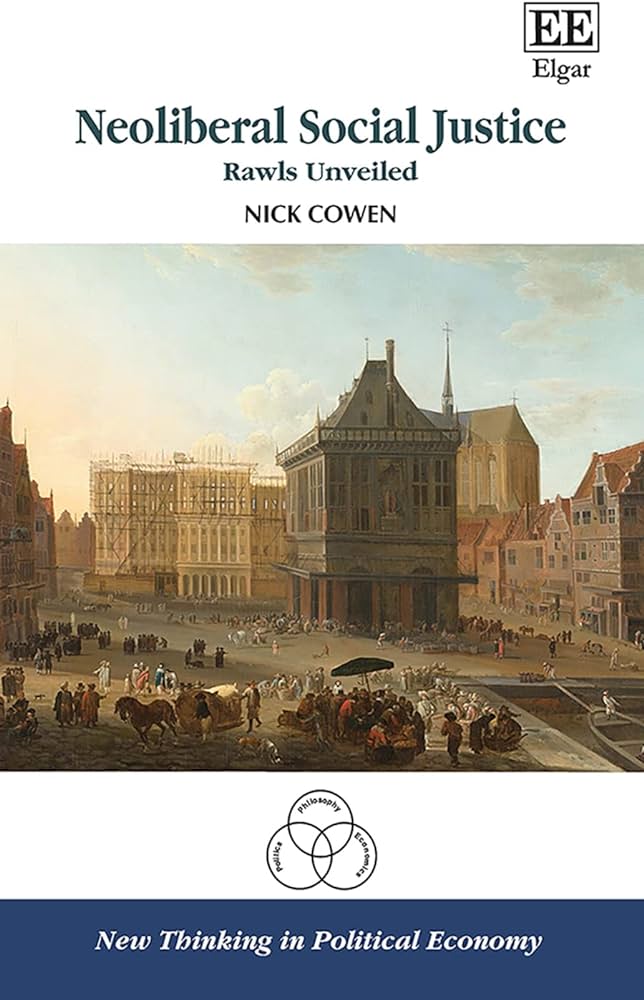
In Neoliberal Justice, Nick Cowen considers the policy implications of Rawls’s theory of ‘justice as fairness’ when realistic assumptions about human behavior and social theory are introduced, arguing in favor of classical liberal or neoliberal democratic policies, albeit without abandoning central aspects of the Rawlsian framework.
Cowen argues in favor of classical liberal or neoliberal democratic policies, which entail constitutional safeguards for commercial activities. He views these policies as commendable, asserting that alternatives like liberal socialism and property-owning democracy would be less effective in achieving justice in practical situations. Embracing this perspective does not require abandoning key aspects of the Rawlsian framework.
Instead, Cowen contends that support for liberal democracy and capitalism arises from a careful extension of Rawls’s principles, taking into account a contemporary understanding of political economy based on recent historical experiences. His approach is prompted by the decisive distinction between civil and economic liberty, as well as Rawls’s ambivalence between private-property and socialist regimes. Cowen claims that this ambivalence is rooted in an unrealistic conceptualization of an economy as a complete ‘system’ and the economic problem being primarily the allocation of scarce resources between alternative ends.
In Rawls’ treatment, an economic system is considered as a single unit. Cowen suggests considering Rawls’s theory alongside an alternative ‘catallactic’ understanding of economic activity, which would more suitably align with the understanding of a political community composed of individual free and equal citizens engaging in an exchange of rights and duties in the form of a social contract, as Rawls envisioned. Thus, Cowen proposes viewing the Rawlsian framework through the lens of robust political economy (RPE). The present book contributes to this perspective by considering significant features of human political and social life, such as imperfect knowledge, bounded rationality, and opportunistic behavior. The book delves into various aspects of distributive justice, constitutional theorizing, and public policy through the lens of Rawlsian Political Economy. It progresses through different levels of analysis: ideal theory, constitutional theorizing, and practical policy-making, all while considering the implications of imperfect knowledge and self-interested behavior within the Rawlsian framework.
In Part I, the author argues for the importance of institutions in ideal theory, defending Rawlsian emphasis on the basic structure as a site of justice. They highlight scenarios where even individuals with extraordinary goodwill can produce detrimental social outcomes, emphasizing the necessity of effective institutions in translating goodwill into cooperation.
Part II explores the epistemic characteristics of institutions necessary for widespread social cooperation. The author contends that certain private-property market institutions are essential due to problems of calculation, discovery, and subjectivity, which non-market alternatives fail to address adequately.
In Part III, the focus shifts to constitutional theorizing, discussing how economic institutions should integrate into a wider political framework. The author proposes a constitutional perspective to evaluate rules necessary for achieving justice as fairness, advocating for commendable constraints on both bureaucratic and democratic interventions in economic activity.
Part IV examines whether economic liberties should be considered basic liberties prioritized in public decision-making, as they contribute to the development of citizens’ essential moral powers. The author argues for the inclusion of economic liberties as preconditions for justice, advocating for their regulation to ensure fair value while maintaining their essential role.
In Part V, the implications of RPE for establishing a Property-Owning Democracy (POD) are outlined, comparing it to Welfare State Capitalism (WSC). The author evaluates the feasibility of a high liberal approach to POD and proposes a robust POD regime aimed at increasing wealth dispersion through alternative mechanisms.
The conclusion emphasizes that the proposals for neoliberal social justice align with Rawls’ conception of justice as fairness, extending rather than critiquing his theory. It acknowledges the need for further theoretical development, particularly regarding global justice and ensuring compliance, while asserting the attractiveness and realism of the novel proposals presented.
The book stands out for its meticulous writing and compelling arguments, offering a comprehensive exploration of Rawlsian economic theory. The author provides a thorough bibliography after each chapter and effectively elucidates the Rawlsian thesis, demonstrating a deep understanding of the subject matter. Throughout the text, the author’s efforts to contribute positively to the Rawlsian economic context and framework are evident, as they engage rigorously with the complexities of distributive justice and institutional design. By synthesizing theoretical insights with practical policy implications, the book not only enriches scholarly discourse but also offers valuable insights for policymakers and practitioners seeking to navigate economic challenges within a Rawlsian framework.
While the author presents a comprehensive argument for his approach to neoliberal social justice based on Rawlsian commitments, several potential shortcomings could be: (1) A limited scope and applicability of Rawlsian theory. The author acknowledges the restricted domain of Rawlsian theory, which primarily applies to an idealized political community under conditions of moderate scarcity and reasonable pluralism. However, by attempting to evaluate real-world regimes through this lens, there’s a risk of overlooking the complexities and nuances of actual social and economic systems. This restricted application might not adequately capture the multifaceted challenges and dynamics present in non-ideal societies, potentially leading to misguided policy recommendations or unrealistic expectations. (2) The assumption of symmetry in knowledge and incentive problems. While the author’s emphasis on analyzing institutions through the lens of Robust Political Economy (RPE) offers valuable insights, the assumption of symmetry in knowledge and incentive problems across political and economic spheres may oversimplify reality. Real-world institutions often face asymmetrical challenges, and the applicability of a uniform framework for evaluating diverse social and economic phenomena may overlook crucial differences. (3) Last but not least, the text shows evidence of a certain idealization of the Rawlsian framework. Despite the author’s attempt to strengthen Rawlsian theory by applying realistic conditions more systematically, the risk of idealizing the framework itself remains. By aligning closely with Rawls’s liberal commitments and assumptions, the author may overlook alternative perspectives and approaches to distributive justice and other types of realistic politics.
While the author’s approach offers valuable insights into the challenges of achieving distributive justice within real-world contexts, it’s important to critically evaluate the scope, assumptions, and applicability of Rawlsian theory to ensure a more comprehensive and nuanced understanding of social and economic dynamics. Based on what is said above, the book is recommended particularly for those with a scholarly interest in political economy, questions of justice, and Rawlsian thought. However, for a general audience without such background, caution may be advised, as its complexity and academic content might make it less accessible and gratifying.
‘Neoliberal Social Justice: Rawls Unveiled’ by Nick Cowen was published in 2021 by Edward Elgar (ISBN: 9781800374539). 231pp.
 Jan C. Bentz is a lecturer and tutor at Blackfriars in Oxford, with interests in how medieval metaphysics shaped modern thought. He also works as a freelance journalist.
Jan C. Bentz is a lecturer and tutor at Blackfriars in Oxford, with interests in how medieval metaphysics shaped modern thought. He also works as a freelance journalist.